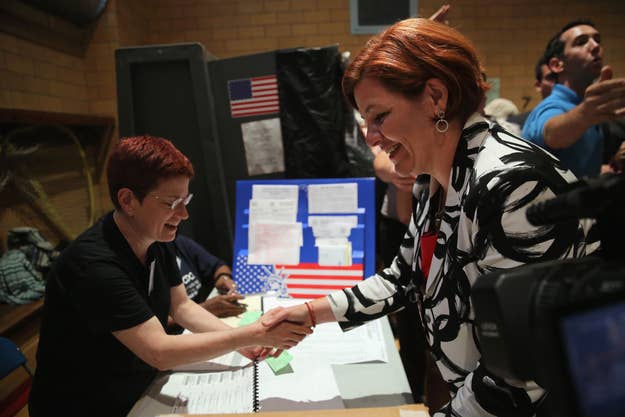
NEW YORK — Despite poor polling numbers over recent weeks and grim exit poll data trickling in from precincts across the city, supporters for out lesbian mayoral candidate Christine Quinn had hoped against hope that she would make it through the Tuesday primary.
As the results began trickling in, however, it became clear that would not be the case.
Quinn, who is speaker of the New York City Council from the 3rd District, would have been the first woman elected mayor of New York City and the first out lesbian to run City Hall.
While the candidate campaigned on the Upper West Side until the final moments before polls closed, supporters outside her election night party in Chelsea lined up to watch the results come in — many of whom said she has run a "solid" and "strong" campaign so far.
Frank Bua of Union Square, praised the candidate for her strong long-term game, but said that if she doesn't make it out of the Tuesday primary, it is the result of a fickle electorate.
"Really to blame would be a bandwagon public," Bua said of people who ran to support her campaign early on but just as quickly ran to support other candidates, first Anthony Weiner and then Bill de Blasio, later. "There is also an underlying, latent sexism that often permeates our decision-making. A strong man is OK, but a strong woman is threatening."
In addition, Bua said she could have more forcefully campaigned on the historic nature of her candidacy and compared her to Hillary Clinton in the 2008 presidential election saying, "Clinton hadn't really campaigned as a woman until she had already lost the primary to Obama. There is a cautionary tale there."
However, Bua firmly stands behind Quinn.
"When it comes down to it, we are New Yorkers," he said. "We are tough. We are principled. We know how to manage the city. As Supreme Court Justice Ruth Bader Ginsburg said, we don't want skim milk marriage. And we don't want a skim milk mayor."
Gil Horowitz, a psychologist from Manhattan, said he has supported Quinn since she worked chief of staff to New York City councilman Thomas Duane (3rd District) in the early 1990s.
"I believe we will come in second because we have had a better get-out-the-vote strategy," he said. "Polling numbers are sometimes misleading because they sample only what is going on in the moment and not the whole story. It doesn't matter who you say you're going to vote for in polls. What matters is how many people you get out to vote and I believe we got more people."
While Horowitz said Quinn has run an "exciting" campaign with historical implications, he acknowledged its problems. Specifically, he said the candidate should have come out against the city's controversial stop and frisk law much sooner — ahead of the other mayoral candidates.
"I would have liked for her to be way ahead of the other candidates," he said. "She has always had mixed feelings about it, but I would have liked for her to be more assertive in modifying it and making it more constitutional. Looking back, I'm sure she would agree with me."
Horowitz also said the closing of St. Vincent's, a neighborhood hospital, negatively affected her campaign. She received criticism for the hospital's closure because it operated in her city council district even though she "valiantly fought to save it," he added.
